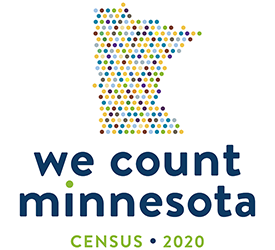Ramsey County and the 2020 Census

The U.S. Constitution requires a count (census) of all people living in the United States every 10 years.
A complete, accurate census count is necessary for equal political representation, fair distribution of federal and state funding, and sound planning and investment in infrastructure, real estate, business development and public policy.
There was no citizenship question on the 2020 Census.
Frequently asked questions
How is the information that is collected used?
Data from the census provide the basis for distributing more than $675 billion in federal funds annually to communities across the country to support vital programs—impacting housing, education, transportation, employment, health care and public policy.
The data is also used to determine the number of congressional seats each state has in the U.S. House of Representatives and redraw the boundaries of congressional and state legislative districts. Minnesota currently has 8 seats in the House, but we’re at risk of losing one. A complete count gives our state the strongest possible voice in DC.
Are my answers safe?
Yes, your information is confidential. The U.S. Census Bureau never identifies you individually. It combines your responses with information from other households or businesses to produce statistics, which never identify your household, any person in your household, or business.
Title 13 of the U.S. Code protects the confidentiality of all your information and violating this law is a crime with severe penalties. In addition, other federal laws, including the Confidential Statistical Efficiency Act and the Privacy Act reinforce these protections. The penalty for unlawful disclosure is a fine of up to $250,000 or imprisonment of up to 5 years, or both.
No law enforcement agency (DHS, ICE, FBI or CIA) can access or use your personal information at any time. Data collected can only be used for statistical purposes that help inform important decisions, including how much federal funding our community will receive.
What information is asked?
The decennial census will collect basic information about the people living in your household. When completing the census, you should count everyone who is living in your household on April 1, 2020.
What information is not asked?
There will be no citizenship question on the 2020 Census. In addition, the Census Bureau will never ask for:
- Social Security numbers.
- Bank or credit card account numbers.
- Money or donations.
- Anything on behalf of a political party.
How do I verify the identity of a census taker who knocks on my door?
If someone visits your home to collect a response for the Census Bureau, you can check to make sure that they have a valid ID badge, with their photograph, a U.S. Department of Commerce watermark and an expiration date.
Additional handouts for the community
- Census 101: What You Need to Know (PDF)
- Información básica sobre el censo: Lo que usted necesita saber (PDF)
- TIROKOOB 101: WAXAAD U BAAHANTAHAY IN AAD OGAATID (PDF)
- Census 101:KOJ YUAV TSUM PAUB TXOG DAB TSI (PDF)
- Census 101: What You Need to Know_Lao (PDF)
- The 2020 Census and Confidentiality (PDF)
- El Censo del 2020 y la Confidencialidad (PDF)
- Tirakoobka 2020-ka iyo Qarsoodiga Jawaabaha (PDF)
- ການສໍ າຫຼວດພົນລະເມືອງປີ 2020 ແລະ ການຮັ ກສາຄວາມລັ ບ (PDF)
- The 2020 Census: Why does it matter? (PDF)
- The 2020 Census: Why does it matter?_Karen (PDF)
- Why We Ask (PDF)
Census response
Maps
The 2020 Census response rates are updated daily on the U.S. Census Bureau's response rate map and show nationwide responses. In addition, information can be viewed by state, county, city and census tract.
The Response Outreach Area Mapper (ROAM), an interactive web mapping tool, helps users see the areas that may be harder to count in the 2020 Census. It shows local census tracts shaded according to their Low Response Scores (LRS), which represent the predicted percentage of households that will not self-respond in the 2020 Census. Click on the census tracts for more information about the people who live there.
Nov. 24, 2020 board workshop
Complete count committee
Ramsey County and the City of Saint Paul established a joint Complete Count Committee (CCC) for the 2020 Census. The purpose of the committee was to work together to achieve a complete count of all our residents. It brought together diverse representatives from local government, community organizations, faith-based groups, education, media and the local business community.
Working together, CCC members raised awareness about how the census works, the importance of an accurate, complete count, and the confidentiality of census data.
The joint CCC was co-chaired by Ramsey County Commissioner Victoria Reinhardt and Saint Paul City Councilmember Mitra Jalali Nelson.